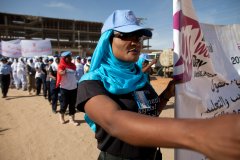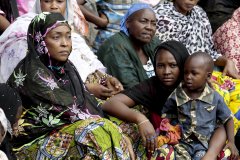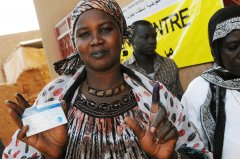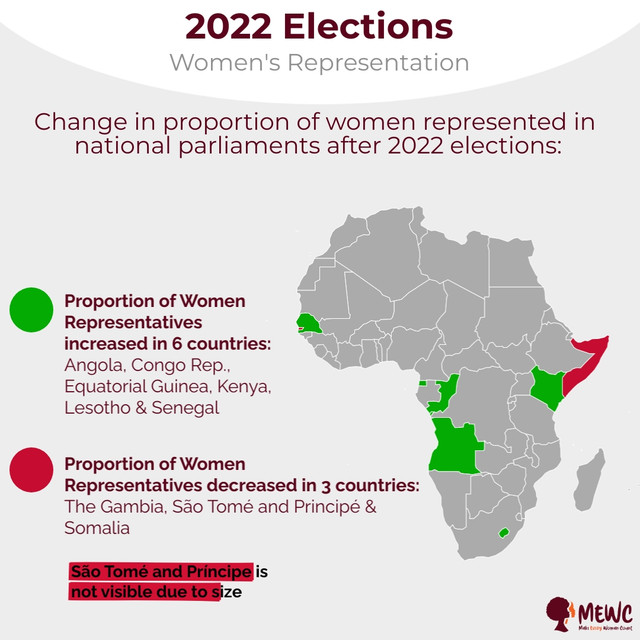Gender Issues Showlist
Women, Peace & Security
UNSCR 1325 calls on all parties to: protect and respect the rights of women and girls in conflict & post-conflict; increase women participation in all conflict resolution, peacekeeping and peace-building & to end impunity by prosecuting perpetrators of sexual and other violence on women and girls
index.php?option=com_content&view=category&id=56&Itemid=1913
Human Rights of Women
Thirty six years after the adoption of CEDAW, many women and girls still do not have equal opportunities to realize rights recognized by law. Women are denied the right to own property or inherit land. They face social exclusion, “honor killings”, FGM, trafficking, restricted mobility, early marriage,...
index.php?option=com_content&view=category&id=44&Itemid=1908
Violence Against Women
Violence against women is the most shameful human rights violation. Gender based violence not only violates human rights, but also hampers productivity, reduces human capital and undermines economic growth. It is estimated that up to 70 per cent of women experience violence in their lifetime
index.php?option=com_content&view=category&id=69&Itemid=1912
Political Participation & Leadership
Where women are fully represented, societies are more peaceful and stable. Women political participation is fundamental for gender equality and their representation in positions of leadership must be a priority for all Africans governments.
index.php?option=com_content&view=category&id=65&Itemid=1911
Latest News
- COTE D'IVOIRE: South-South Meeting to Promote Gender Equality and Combat Deforestation
- RWANDA: Rwanda Set to Launch Cervical Cancer Elimination Plan
- NIGERIA: Over 5,000 Nigerian Women Stranded in Iraq - Govt
- SUDAN: Healthcare Collapse Threatens Pregnant Women in Sudan's Sharg El Nil
- GHANA: President Nominates 12 More Ministers
- Senegal: Parliamentary election 2024
- Mauritius: Parliamentary election 2024
- Ghana: Presidential and Parliamentary Elections
- Botswana: Parliamentary elections 2024
- Algeria: Presidential Election 2024
SOUTH SUDAN: Striving for Equity in Health for Women
Source: AllAfrica
Today, March 8, marks International Women's Day, a day in which to both note the tremendous strides women have made globally over the past 100 years, as well as acknowledge the challenges that remain, particularly when it comes to health issues.
Throughout the world, all too often women delay care when sick. All too often, women acquiesce to husbands who insist that their wives deliver at home with an untrained relative, in accordance with traditions. All too often, women cannot say no to sex or insist on safe sex. All too often women are accused of sorcery or infertility if too long passes between child births. And all too often it is women in developing countries like South Sudan who suffer most as a result.
In South Sudan, this reality has severe implications. The nation has the world's highest maternal mortality, at 2,054 deaths per 100,000 live births. That means that the mother of one of every 48 children born alive dies while giving life. Girls have a higher chance of dying in childbirth than finishing school. One-third of women are married by the age of 19. The same proportion will already have delivered their first child by that age, and the average woman will deliver seven times in her life. Eighty-seven percent of women will deliver in their home, almost always without a skilled attendant. Eighty percent of women polled claim it is justifiable for a man to beat his wife under certain circumstances.
To say that women in South Sudan face a daunting path is an understatement.
But despite this, there is hope. Women are taking up leadership positions in the government, entering the workforce, improving women's health access and services, and increasing female school attendance.
And as the country grows, so does the workforce. More and more, people displaced for decades during the civil war with the north - Sudan - are now returning to their home country. Many are bringing back skills and schooling obtained while abroad. In South Sudan and neighboring countries, training schools for teachers, midwives and clinical officers are slowly increasing the skilled human resource pool in the country.
In South Sudan's newly formed government, seven of 29 ministers are women. All government levels are slated to have at least 25 percent of seats filled by women, and while this is not attained at all levels, there has been great improvement in women's involvement.
In the health sector, the government is focusing on improving women's health through increasing antenatal care visits, access to family planning, and knowledge about HIV/Aids prevention and treatment.
One program, the Sudan Health Transformation Project, phase two (SHTP II), which is funded by the United States Agency for International Development, and led by Management Sciences for Health, is working in close partnership with the Ministry of Health to roll out these interventions at the primary health care level, which is where most people in the country access their initial health services. SHTP II helps to provide drugs, equipment and staff training for more than 160 health facilities across South Sudan.
In the past two years, SHTP II provided over 45,000 family planning counseling sessions, 66,000 first antenatal care visits, distributed more than 41,000 second doses of intermittent preventive therapy, which helps prevent malaria during pregnancy, and provided more than 42,000 bed nets to pregnant women.
There is still a long path for women - both throughout the global community, as well as here in South Sudan - to travel in the quest for greater equity. Despite challenges though, there is real progress being made on the ground. In the words of Christine, a midwife at Thiet Primary Health Care Center in Warrap State, while discussing the slow increase of women seeking family planning methods, "Culture, it is slow to change. But slowly, slowly, we are getting there."





